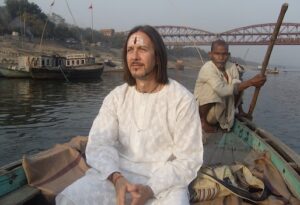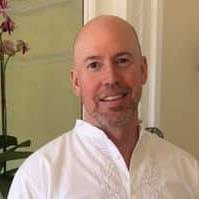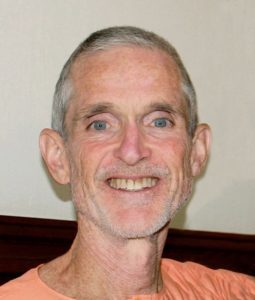Full Moon Chanting
Free | ONLINE | Please register in advance, a Zoom link and passcode will be provided via confirmation email.
We gather once a month to chant the Gayatri Mantra, the great mantra of Light and Liberation, to maximize the spiritual benefits of the full moon.
“oṃ bhūr bhuvaḥ svaḥ
tat savitur vareṇyaṃ
bhargo devasya dhīmahi
dhiyo yo naḥ pracodayāt”
– Rigveda 3.62.10[11]
 Snehan Born, e-RYT500, has four decades of experience with yoga and has been teaching Integral Yoga since 2000. Snehan resides at the Integral Yoga Institute of San Francisco, where he serves as assistant to Swami Ramananda, teaches yoga classes and is a lead teacher trainer. He has also led trainings at Satchidananda Ashram, Yogaville, Virginia, The Integral Yoga Institute in New York City and privately in Hawaii where Snehan co-created the Metamorphous Yoga Studio. Snehan is certified in all levels of Integral Yoga Hatha and has received additional certifications in Pranayama, Meditation, Raja Yoga and Stress Management from Integral Yoga and “Life of a Yogi” certification from Sri Dharma Mittra. In 1997 Snehan studied with Deepak Chopra in Goa, India and again in 2001 in Agra, India where he was asked to teach an Integral Yoga class to about 250 participants. Also, in 2001 he received “Conscious Eating”, a live foods certification from Dr. Gabriel Cousens at the Tree of Life Rejuvenation Center in Arizona.
Snehan has lived and traveled extensively within India (over 9 trips) and practiced with many teachers there. He has taught yoga all over the US as well as in India, Nepal, South America, Australia, New Zealand, Mexico, Japan and Europe.
Snehan Born, e-RYT500, has four decades of experience with yoga and has been teaching Integral Yoga since 2000. Snehan resides at the Integral Yoga Institute of San Francisco, where he serves as assistant to Swami Ramananda, teaches yoga classes and is a lead teacher trainer. He has also led trainings at Satchidananda Ashram, Yogaville, Virginia, The Integral Yoga Institute in New York City and privately in Hawaii where Snehan co-created the Metamorphous Yoga Studio. Snehan is certified in all levels of Integral Yoga Hatha and has received additional certifications in Pranayama, Meditation, Raja Yoga and Stress Management from Integral Yoga and “Life of a Yogi” certification from Sri Dharma Mittra. In 1997 Snehan studied with Deepak Chopra in Goa, India and again in 2001 in Agra, India where he was asked to teach an Integral Yoga class to about 250 participants. Also, in 2001 he received “Conscious Eating”, a live foods certification from Dr. Gabriel Cousens at the Tree of Life Rejuvenation Center in Arizona.
Snehan has lived and traveled extensively within India (over 9 trips) and practiced with many teachers there. He has taught yoga all over the US as well as in India, Nepal, South America, Australia, New Zealand, Mexico, Japan and Europe.




